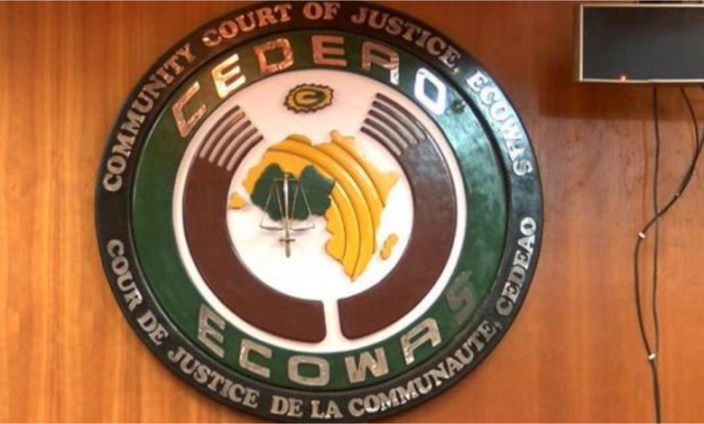The ECOWAS Court of Justice has ordered the Republic of Burkina Faso to pay 50 million CFA as compensation to a retired civil servant, Mr. Kam Sibiri Eric.
The compensation is for the moral damages he suffered following his dismissal 20 years ago allegedly for "breach of the duty of discretion."
Delivering judgement in the suit, Justice Ricardo Monteiro Gonçalves, the judge Rapporteur, held that the Respondent State violated the Applicant's right to an effective remedy pursuant to Articles 7(1) of the African Charter, 14(5) of the ICCPR and 8 of the Universal Declaration of Human Rights.
The Court also held that applicant's right to be tried within a reasonable time by an impartial tribunal by the Respondent was also violated in accordance with Articles 7(1) and 26 of the African Charter, 9 and 14(3)(c) of the ICCPR and 8 of the Universal Declaration of Human Rights.
In a suit, the applicant said he worked as the Head of the Legal Affairs and Research Division of the Mediator of Faso until November 2002 when his appointment was terminated by decree for the breach of the duty of discretion.
He averred that several failed steps were taken to get the government to reconsider its action, including suing the administrative court in Ouagadougou which after four years on 8th May 2007 annulled the decree and ordered his reinstatement.
But the Faso mediator appealed the judgment before the Council of State, which reversed the contested judgment and rejected as being ill-founded the request for annulment of the disputed decree.
In response to the decision of the Council, the Applicant lodged an appeal on points of law on July 6, 2007 which is still pending before the Council.
Faced with situation, the applicant, who was represented by his counsel, Mr Naboswindé Barthélémy Zongo approached the ECOWAS court asking it to hold the government in violation of his human rights and to pay him the sum of seventy-six million nine hundred and twenty-nine thousand seven hundred (76,929,700) CFA francs as damages.
He averred that by delaying the case for more than 13 years, a situation he construed as a refusal to hear his appeal, the Council of State violated his right to fair and timely trial contrary to the country’s obligation under the various international instruments to which it is signatory, particularly the Universal Declaration of Human Rights.
He also cited the preamble of the country’s constitution which provides under Article 8 that “Everyone has the right to an effective remedy by the competent national tribunals for acts violating the fundamental rights granted him by the constitution or by law.”
Unfortunately, the applicant pointed out that "although the appeal in cassation is instituted by law n°15-2000/AN relating to the Council of State, it is clear that the judicial body did not examine the case."
He contended that effective remedy, even if it exists in law, had been rendered non-existent in this case as a fair trial is one that is held within a reasonable time.
In the present case, he said the Council neither communicated with the Applicant on the case nor notify him of the status describing this as a violation of a fair trial within a reasonable time, especially when it comes to restoring a civil servant to his administrative position.
The applicant relied on Article 10 of the Universal Declaration of Human Rights which stipulates that: "Everyone has the right, in full equality, to have his case heard fairly and publicly by an independent and impartial, who will decide either on their rights and obligations or on the merits of any criminal charges brought against them. »
Among the other international instruments relied on which the country is signatory, are the International Covenant on Civil and Political Rights in its article 2.3 paragraph a and paragraph b and the African Charter on Human and Peoples' Rights in its article 7 (1) and (2).
The applicant said the violations caused him moral and psychological damages and that the inaction of the Council on his appeal, despite several unanswered correspondences, demoralized him while his premature retirement adversely affected him financially.
During the judgment, the Republic of Burkina Faso was not represented while Mr Sibiri’s lawyer was represented by Barthelemy Zongo.
Also in the three member panel on the case were the president of the Court, Justice Edward Amoako Asante, presiding, and Justice Dupe Atoki.
Latest Stories
-
Trump picks Pam Bondi as attorney general after Matt Gaetz withdraws
2 mins -
Providing quality seeds to farmers is first step towards achieving food security in Ghana
8 mins -
Give direct access to Global Health Fund – Civil Society calls allocations
3 hours -
Prince Harry jokes in tattoo sketch for Invictus
4 hours -
Akufo-Addo commissions 200MW plant to boost economic growth
4 hours -
Smallholder farmers to make use of Ghana Commodity Exchange
4 hours -
I want to focus more on my education – Chidimma Adetshina quits pageantry
4 hours -
Priest replaced after Sabrina Carpenter shoots music video in his church
4 hours -
Duct-taped banana artwork sells for $6.2m in NYC
5 hours -
Arrest warrants issued for Netanyahu, Gallant and Hamas commander over alleged war crimes
5 hours -
Actors Jonathan Majors and Meagan Good are engaged
5 hours -
Expired rice saga: A ‘best before date’ can be extended – Food and Agriculture Engineer
5 hours -
Why I rejected Range Rover gift from a man – Tiwa Savage
5 hours -
KNUST Engineering College honours Telecel Ghana CEO at Alumni Excellence Awards
5 hours -
Postecoglou backs Bentancur appeal after ‘mistake’
6 hours

